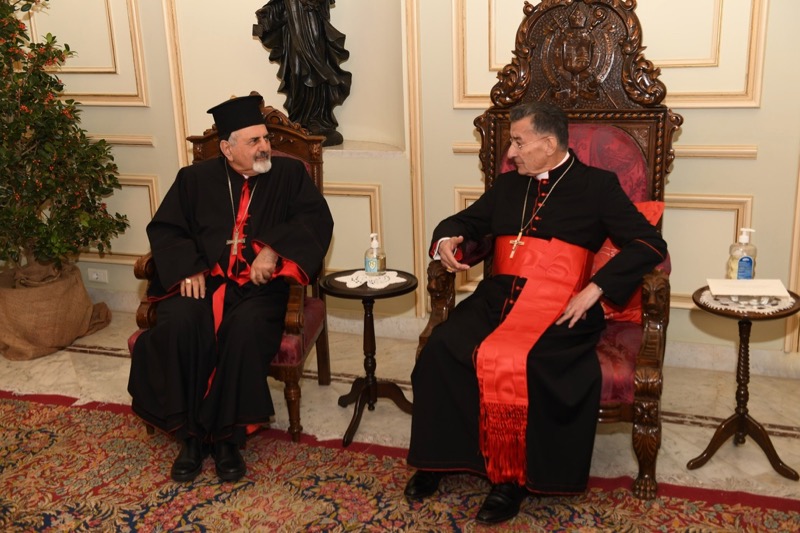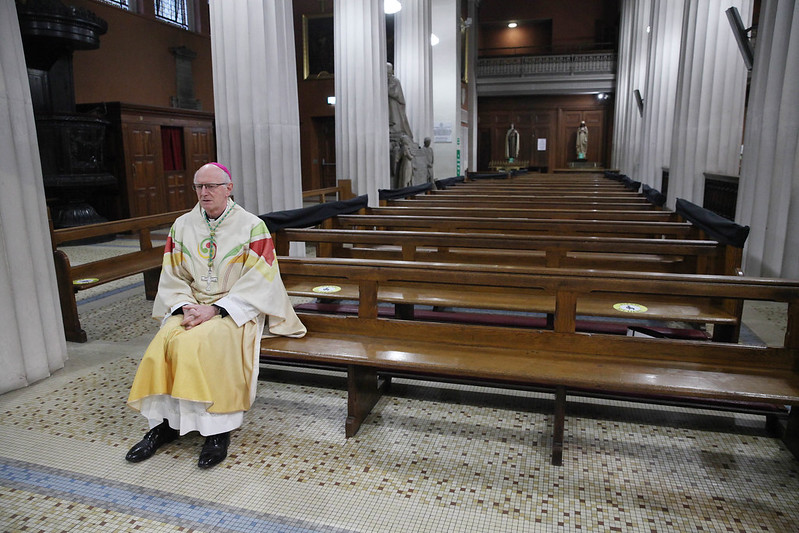Archbishop Dermot Farrell of Dublin has urged parishes to put climate action on their parish council’s agenda as a new year’s resolution and to see what changes parishes can make in 2022 in response to the climate crisis.
Last August, Archbishop Farrell published his first pastoral letter as Archbishop of Dublin. The Cry of the Earth – the Cry of the Poor addressed the climate crisis just ahead of the COP26 summit in Glasgow and highlighted how environmental degradation is linked to poverty, suffering and migration.
Speaking to The Tablet at Christmas, the Archbishop said the pastoral letter had been “well received” and had turned out to be a more comprehensive text than had been originally envisaged.
“The more I worked on it, the more I began to appreciate the profound interrelatedness of the various dimensions of the climate crisis.”
The 67-year-old who is almost a year at the helm of the largest Irish diocese cited the direct link between clean water and attendance at school as an example of this interrelatedness as well as how the deterioration of the oceans has a direct effect on all.
“Without the oceans our planet would be as inhospitable as Mars: no meadows, no insects, no forests, no flowers, no birds, no animals, no humans. The title of the pastoral letter itself is the key realisation of this: the cry of the earth (climate change and all that comes in its wake) is intimately related with issues of injustice, exploitation, and exclusion,” he said.
Highlighting how the industrialisation of agriculture and the drive towards monoculture have wreaked havoc on the environment, he said this resulted in soils being depleted, sometimes in whole regions, while the ground became less productive to the point of desertification.
“This leads to mass migration of people in search of food. The climate crisis is both an environmental crisis and a human crisis. It affects our planet and our future, and has its roots in the way that we approach poverty and in the way that we treat the vulnerable and those on the margins of life, both here in Ireland, and across the world - not just in the developing world, but the hidden poor and disadvantaged in the developed world as well.”
“It affects every aspect of our lives, from the clothes we wear, to food we eat, to the cars we drive, to the options we make for the types of homes we live in, and it affects everyone: urban dwellers, those who live on the land, and everyone in between.”
Archbishop Farrell, who is a former president of St Patrick’s College Maynooth, emphasised the importance of an “inclusive approach” to tackling the crisis because “an ideological approach will alienate the vast majority of people and will bear no fruit. Zealotry and commitment are not the same thing. It is vital that we seek an approach that empowers all people to take this necessary road.”
He also emphasised that the world is God’s gift to all God’s creatures.
“Seeing the world as God’s gift changes our perspective and renders possible all sorts of change. That is why significant sections of the pastoral letter are invitations to prayer for our wounded planet and the wonders of the extraordinary world, full of beauty and mystery where God has put us, in order that we may have life and have it to the full.”
He added, “True prayer is an encounter with reality, not a flight from reality” and he paid tribute to Pope Francis, who he said is “offering us wonderful leadership in caring for our common home” and has made care for creation “a central element in his ministry”.
Asked about his first year as Archbishop of Dublin and whether he was hopeful for the future of the diocese, he explained that the last year “has been busy, getting to know the people, priests, parishes and members of the many religious congregations in the Archdiocese. The warmth of the traditional Dublin welcome, as well as the support of both the people and the priests that I have experienced in so many parishes during the past year, has been truly uplifting and assuring.”
“It has also been a hope-filled time, the initiation of the renewal journey for the diocese, as well as the announcement by Pope Francis of the synodal way. Hope is crucial in every person’s life, and hope is crucial in life’s faith dimension, because we believe that our Church is already being changed according to the plan of God. As Pope Francis constantly reminds us, hope ‘is able to see a tomorrow; hope is the door that opens onto the future.’ Hope changes everything.”
The strategic plan in development for Dublin seeks to address the collapse in revenue and the challenge of declining priest numbers as well as the drop in Mass attendances. The 'Building Hope Task Force Report' highlights three elements for a pastoral strategy – one of which is engagement between the diocese and individual parish communities.
“I look with hope to the future as all the baptised are called to deepen their faith, give witness to it and share it with others. We live our faith as a community. Like the air we share, which is intensely personal and profoundly communal, so faith has both essential personal and communal dimensions. To develop and mature, faith needs both dimensions; they go hand-in-hand.”
He noted that the taskforce report had noted: “true hope is best experienced when we support one another. To flourish it requires solidarity which expresses itself in life-giving communities where everyone can participate in decision making.”
In the handing on of the faith, two of the most important communities, he believes, are the family and the parish.
“My years of experience at parish and diocesan level underpin the value of family. We have to constantly evangelise and share the good news, that is our Christian faith but there is also a huge role for re-evangelisation in our parishes especially amongst young people and families.”
“We need to re-discover anew the power, the consolation, the hope, and the new horizons that God gives us in Christ. As you can appreciate, this is not a road into the past, but a way into the new future.”
Archbishop Farrell believes a discernment of the Spirit will be required to find a way forward.
“As Christians we are called to bring Good News to our world, to accompany people at all stages of life’s journey towards an encounter with Jesus Christ.”
“Notwithstanding the immensity of these challenges, some of which have become even more stark as a result of the coronavirus crisis, I am hopeful for the future of the diocese because there are many people of faith in our parishes who constantly pray, are actively involved in their faith communities, do not deny their Catholic tradition and identity, and who have an understanding of the Church that is different from the one propagated by popular knowledge.”
“From my pastoral visits it is clear that Catholicism has a firm centre in the parishes of Dublin, but also peripheral circles which are culturally Catholic.”



 Loading ...
Loading ...